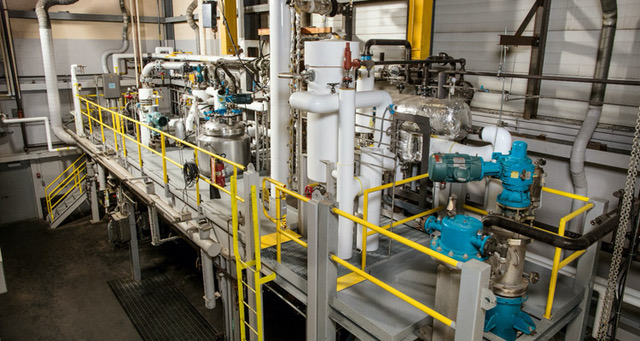Pilot Testing & Scale-Up
Systems

Overview
Before chemical production begins, or construction starts, and before engineers design the facility, an optimal chemical process must be developed, and proven. At GMM Pfaudler’s world-class Process Test Facilities, our experienced chemical process engineers perform pilot testing and develop and optimize your process, as well as collect the data required to design your commercial-scale facility.
Facilities
Our world-class Process Test Facility located in:
- America (Rochester - NY),
- Europe (Waghäusel – Germany)
- Asia (Karamsad - India)
Pfaudler’s pilot testing facilities support its reaction, evaporation, distillation, separation, filtration, and drying technologies for its Pfaudler, Normag and Mavag brands.
The process equipment and utilities in Pfaudler’s facilities are custom-configured for each of its client’s needs.
Pfaudler has multiple utility systems, providing a wide range of operating conditions, including: a high-capacity multi-stage vacuum system, for vacuum down to less than 0.01 millibar, hot thermal oil up to 345°C, steam to 180°C, and cooling systems from -12° to 140°C.
Pfaudler’s facilities are designed to handle flammable and corrosive products in volumes as low as a 1 liter and up to 1000 liters totes.
Typical applications
Typical reasons for testing at Pfaudler’s Process Test Facility include: new process development, product purification, yield and purity improvement, process optimization for cost-reduction and increased profit, spent acid recovery, and VOC reduction to meet environmental regulations.
Just a few of Pfaudler’s product examples:
- Polymers, pre-polymers, monomers
- Sterols
- Spent acid recovery
- Vitamin E and Vitamin C
- Biodiesel
- Polyols for new green technologies
- Oil re-refining
- Omega 3 (fish oil)
- Solvent recovery
- PT-Meg
- Triethanolamine
- Waxes
Technologies
Pfaudler’s facilities contain the following core technologies from Pfaudler, Normag, and Mavag brands:
Wiped Film Evaporators (WFEs)
Pfaudler utilizes its WFEs for separations/purifications in difficult applications (high viscosity, fouling, high boiler or heat sensitive products). Pfaudler has several WFEs in 316L stainless steel and Pfaudler utilizes its WFEs for separations/purifications in difficult applications (high viscosity, fouling, high boiler or heat sensitive products). Pfaudler has several WFEs in 316L stainless steel and borosilicate glass construction, ranging in size from 0.1m² to 0.8 m² in both short path design (with internal condensers) and Top Vapor Outlet (TVO) style with external condensers. The WFEs can be arranged in single or multiple stage setups.
High Vacuum Distillation Column
For finer separations, Pfaudler has both borosilicate glass and glass-lined steel distillation column setups. Pfaudler’s systems can be configured for either batch or continuous modes.
Recirculated Flash Evaporator
For simpler separations, Pfaudler has recirculated flash evaporation systems. The systems can be utilized as a stand-alone process step or as the first process step in a more complex, setup including Pfaudler’s WFEs or column systems.
Reactor
113.5 liter glass-lined steel reactor to test corrosive reaction applications and 378 liter stainless steel reactor for less corrosive applications.
Agitated Nutsche Filter Dryer (ANFD)
0.15sqm Mavag Mavalab for testing safe, contained, filtration, washing, and drying of pharmaceutical API’s and intermediates and other high purity compounds.
MAVASPHERE® Spherical Dryer
Multipurpose unit for drying of pharmaceuticals (API) and fine chemicals under cGMP-compliant conditions.
Excellent drying performance over a wide range of filling degree (turn down ratio) High availability due to simple machine design and very good access for inspection.
Conical Dryer Blender (CDB)
0,6m diameter, glass-lined CDB with 74 liter working capacity provides gentle, non-stick vacuum drying for corrosive materials, as well as pharmaceutical API’s and intermediates.
Analysis and reporting
With Pfaudler’s Process Test Facilities, “in-process” sample-analyses are possible. The analytical capabilities of Pfaudler’s laboratory allow for in-process adjustments, in order to optimize operating conditions for ideal results.
Pilot testing concludes with a comprehensive report that includes the scope, objectives, and sample analytical results, accompanied by conclusions and recommendations.




